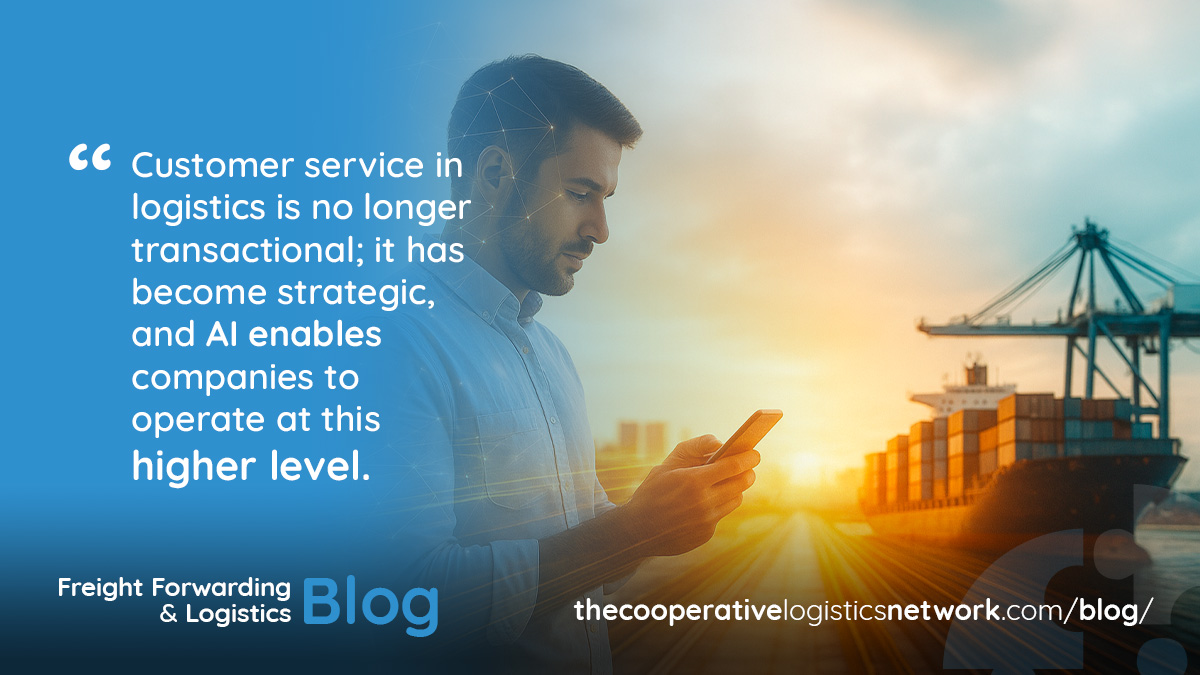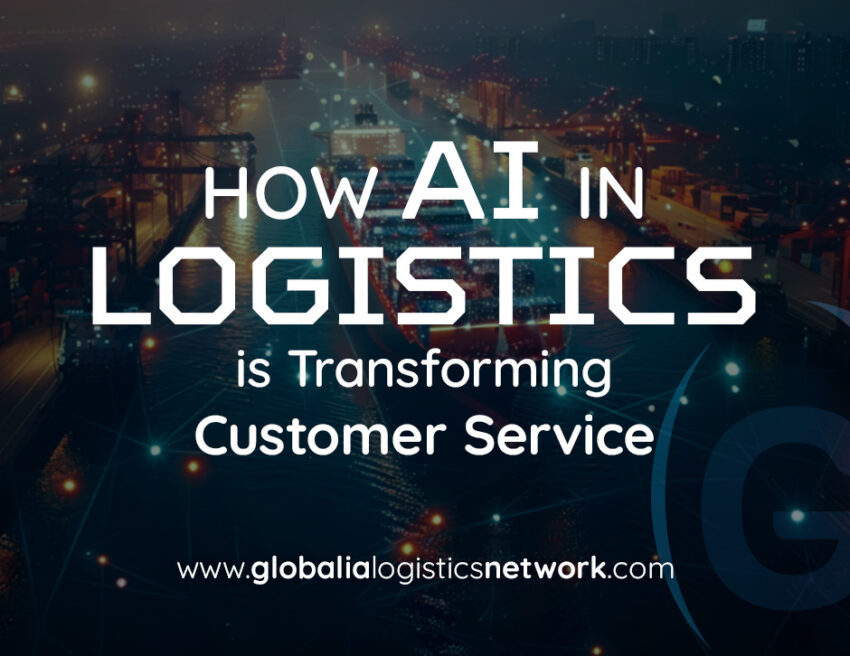The logistics industry has always revolved around efficiency, accuracy, and speed, but today’s market presents challenges that go far beyond moving goods from point A to point B. Competition among freight forwarders has intensified, with multinational companies dominating large contracts and smaller, independent forwarders constantly looking for ways to stand out. Clients have become more demanding, expecting not just timely deliveries, but also full transparency, real-time updates, and proactive communication throughout the shipping process.
In this environment, traditional methods of customer service are no longer enough. Responding to client inquiries as they arise is no longer sufficient; forwarders need to anticipate needs, prevent delays, and provide accurate information before clients even ask. AI in logistics is emerging as a powerful solution that addresses these challenges. By combining advanced analytics, automation, and predictive insights, AI enables freight forwarders to meet client expectations, reduce errors, and maintain a competitive edge in a crowded market.
Predictive insights for proactive customer service
One of the most powerful ways AI enhances customer service in logistics is through predictive insights. Freight forwarders deal with a constant flow of variables such as traffic congestion, weather conditions, customs delays, or port congestion, which can affect the timely delivery of shipments. AI systems analyze historical data, real-time updates, and external factors to predict potential issues before they occur.
For clients, this means receiving notifications about delays or changes in delivery schedules before they even inquire. Proactive communication reduces uncertainty, builds trust, and positions the freight forwarder as a reliable partner rather than just a service provider. Clients increasingly expect this level of foresight, and companies that can provide it differentiate themselves from competitors who still rely on reactive approaches.

Streamlining communication with intelligent automation
Another way AI improves customer service in logistics is through intelligent automation. Many logistics inquiries are routine: tracking updates, documentation questions, or shipment status confirmations. AI-powered systems can handle these repetitive queries through chatbots, virtual assistants, or automated notification platforms.
By automating routine communications, forwarders can provide immediate responses to clients 24/7, freeing human staff to focus on complex or high-value interactions. Automation also ensures consistency in messaging and reduces the risk of human error, which can be costly in logistics operations. Clients benefit from faster, more accurate responses while staff are able to concentrate on solving the issues that require critical thinking and expertise.
Enhancing customer experience with personalized services
AI doesn’t just improve efficiency; it enhances the customer experience. Modern freight forwarders can leverage AI to analyze client behavior, shipment history, and communication preferences to provide personalized service. This can include recommending optimal shipping routes, offering tailored delivery schedules, or proactively suggesting solutions when a shipment faces potential disruption.
Personalized service builds stronger relationships with clients, increases satisfaction, and fosters loyalty. In a market where client retention is as critical as acquiring new business, the ability to provide bespoke solutions and demonstrate understanding of individual client needs is invaluable. Customer service in logistics is no longer transactional; it has become strategic, and AI enables companies to operate at this higher level.
Reducing errors and improving accuracy
Errors in documentation, shipment tracking, or communication can be costly, both in terms of finances and client trust. AI helps reduce these errors by validating information, cross-referencing data in real-time, and flagging potential discrepancies before they impact the client.
For instance, AI-driven systems can check shipping documents against regulatory requirements, verify customs forms, and ensure that cargo labels match shipment details. This not only prevents delays and penalties but also gives clients confidence that their goods are being handled accurately and professionally. Reducing mistakes directly contributes to a smoother customer experience, which is increasingly a key differentiator in freight forwarding.
Optimizing multimodal logistics
Modern supply chains often involve multimodal transport, where cargo moves across road, rail, air, and sea. Coordinating these complex operations while keeping clients informed is a major challenge for forwarders. AI in logistics enables real-time tracking across multiple modes of transport, providing a single unified view of a shipment’s status.
Clients can access detailed information about location, estimated arrival times, and any potential delays. This visibility reduces anxiety and builds trust, particularly for high-value or time-sensitive shipments. Forwarders gain the ability to intervene proactively, reroute cargo if necessary, and provide updates that demonstrate competence and reliability.
Predictive maintenance and reliability
AI doesn’t only improve client-facing operations; it strengthens backend reliability as well. Predictive maintenance powered by AI allows logistics companies to monitor vehicles, machinery, and equipment in real time, forecasting when maintenance will be needed before breakdowns occur. For clients, this translates to fewer unexpected delays and more consistent service. They experience reliable delivery schedules and fewer interruptions in their supply chain, which reinforces confidence in the freight forwarder’s capabilities. Predictive maintenance, combined with AI-driven route planning and inventory management, creates an end-to-end system where reliability is built into the logistics process.
The competitive advantage of AI in logistics
The adoption of AI gives freight forwarders a tangible competitive advantage. By improving efficiency, accuracy, and client communication, AI enables companies to operate more effectively while providing superior service. Small and mid-sized logistics providers can now compete on a more equal footing with large global players by offering proactive, transparent, and personalized services. AI-driven insights, automated communication, predictive problem solving, and operational optimization all contribute to a smoother, more satisfying experience for clients. In a market where customer expectations are rising and competition is fierce, leveraging AI is essential for growth, retention, and reputation.
Conclusion
AI in logistics is transforming the way freight forwarders interact with clients. From predictive analytics to automated communication and personalized solutions, AI allows companies to anticipate problems, reduce errors, and deliver proactive, reliable service. Clients now expect transparency, accuracy, and responsiveness at every stage of the shipping process, and AI equips forwarders to meet these demands effectively.
By integrating AI thoughtfully into operations and customer service strategies, freight forwarders can enhance client satisfaction, strengthen relationships, and differentiate themselves in an increasingly competitive market. Coupled with network support that amplifies their achievements and credibility, AI empowers logistics companies to turn technology into a strategic advantage, delivering both operational excellence and exceptional customer service in logistics.


